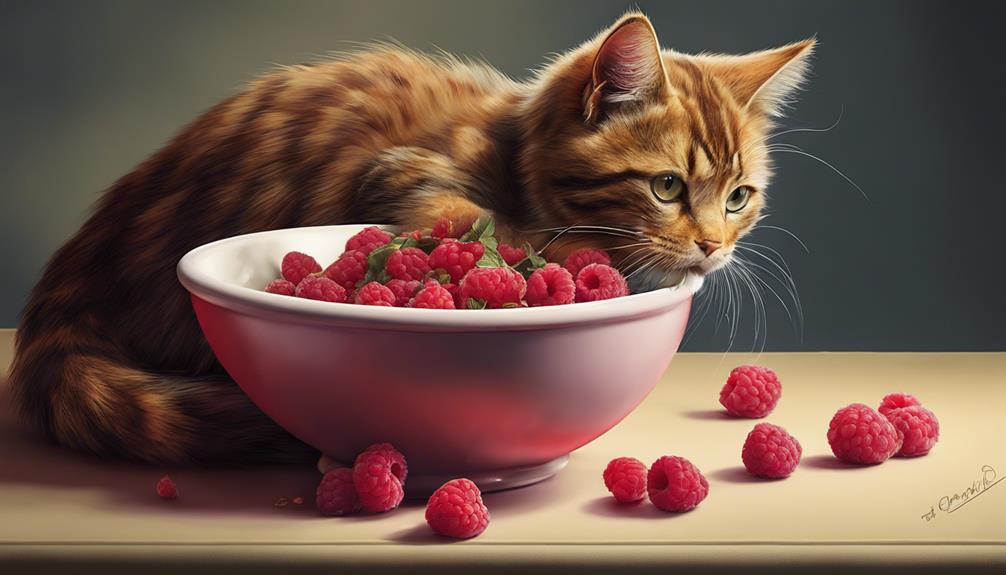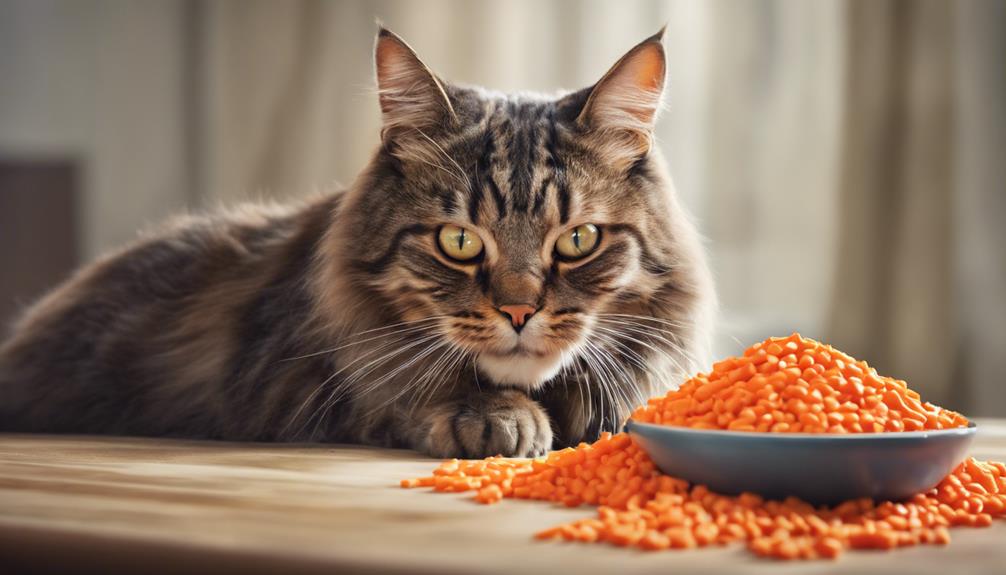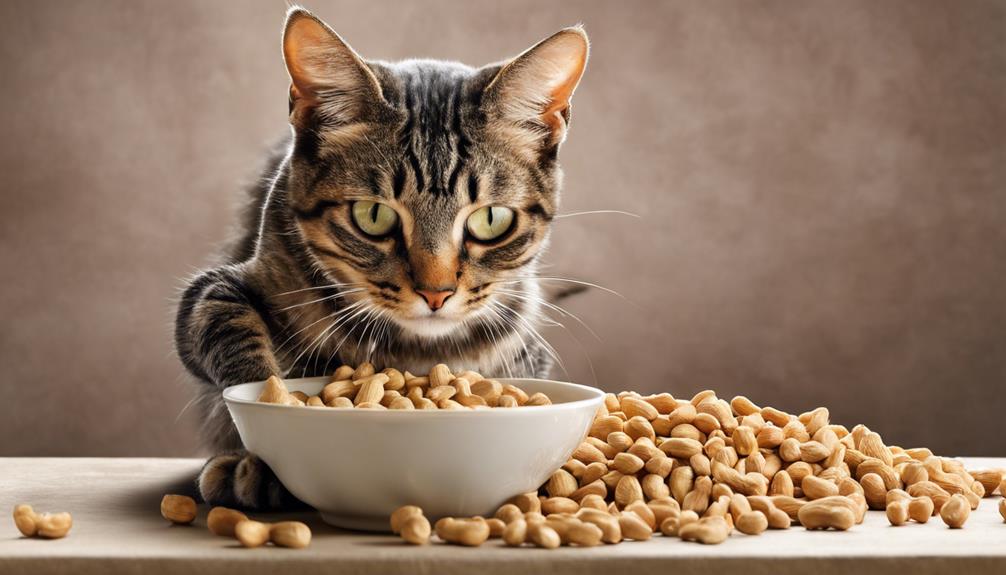Cats can safely enjoy raspberries in moderation. They are packed with fiber, vitamins, and minerals that promote well-being. However, there are risks to contemplate. Excessive intake can lead to digestive issues and vitamin imbalance. To avoid problems, cut raspberries into small pieces and introduce them gradually. Monitor your cat for any adverse reactions. Stick to one or two raspberries per week to prevent health issues. Remember, a balanced diet is key. More insight awaits on the benefits and risks of feeding your feline friend raspberries.
Key Takeaways
- Limit raspberry intake to one or two per week to prevent health issues.
- Monitor for adverse effects like vomiting, diarrhea, or allergic reactions.
- Cats lack enzymes to efficiently process plant material like raspberries.
- Xylitol in raspberries can be toxic to cats in large quantities.
- Consult with a veterinarian before adding raspberries to a cat's diet.
Benefits of Raspberries for Cats
Raspberries offer cats a multitude of health benefits due to their rich content of dietary fiber, antioxidants, and essential vitamins and minerals. These delicious berries aren't just a tasty treat but also a nutritious addition to your feline friend's diet. The dietary fiber in raspberries aids in digestion, keeping your cat's gut healthy and happy. Antioxidants found in raspberries, such as vitamins C and K, along with manganese, play an important role in preventing cell damage and promoting overall well-being in cats.
Feeding your cat raspberries can be a safe and enjoyable way to boost their health. The low fat and calorie content make raspberries a guilt-free snack option for your furry companion. By incorporating raspberries into your cat's diet, you can help them maintain a healthy weight and reduce the risk of obesity-related health issues. So, next time you're enjoying some raspberries, consider sharing a few with your feline friend for a significantly beneficial treat!
Risks of Feeding Cats Raspberries

Incorporating raspberries into your cat's diet may pose risks that pet owners should be aware of. While these fruits offer some benefits, it's important to understand the potential dangers they can present to your feline friend's health. Here is a breakdown of the risks associated with feeding cats raspberries:
| Risk of Feeding Cats Raspberries | |
|---|---|
| Xylitol Toxicity | Large quantities of xylitol in raspberries are harmful to cats. |
| Digestive Issues | The high fiber content in raspberries can cause vomiting or diarrhea in cats with sensitive stomachs. |
| Vitamin C Overdose | Excessive raspberries can lead to Vitamin C overdose and pH imbalance in cats. |
Keeping these risks in mind, it is important to be cautious when introducing raspberries into your cat's diet. Prioritizing your cat's safety and health means being mindful of the potential dangers these fruits can pose. Stay tuned to learn more about how to avoid these risks and promote your cat's well-being.
Avoiding Risks of Raspberry Consumption

When presenting raspberries to cats, it's crucial to be mindful of potential digestive issues and allergic reactions. Cutting the berries into small pieces and introducing them gradually can help prevent any choking hazards or stomach upset.
Remember to monitor your feline friend closely for any adverse effects after indulging in this treat.
Potential Digestive Issues
To prevent potential digestive issues in cats, it's advisable to monitor their intake of raspberries carefully due to the high fiber content of this fruit. Cats may experience gastrointestinal upset if they consume too many raspberries. Here are some important points to keep in mind:
- Raspberries can cause digestive issues in cats due to their high fiber content.
- Cats with sensitive stomachs may suffer from vomiting or diarrhea if they eat excessive raspberries.
- Limiting raspberry intake is essential to prevent gastrointestinal upset in cats.
- Excessive consumption of raspberries can disrupt the pH levels in a cat's digestive system.
- Monitoring raspberry intake and feeding in moderation can help avoid potential health issues in cats.
Allergic Reactions in Cats
Let's be careful about feeding cats raspberries as they can trigger allergic reactions that may lead to itching, swelling, or gastrointestinal issues. Allergic reactions in cats can be caused by specific proteins or compounds in raspberries. These reactions vary in severity and may necessitate veterinary attention.
It's important to watch for any signs of allergic reactions after introducing raspberries into a cat's diet. If a cat displays symptoms like itching, swelling, or digestive problems after consuming raspberries, it's best to avoid giving them this fruit in the future. Remember, your cat's health is a top priority, so always consult a veterinarian if you suspect an allergic reaction.
Stay vigilant and keep your furry friend safe and healthy.
Recommended Raspberry Intake for Cats

When it comes to feeding your feline friend raspberries, it's important to keep a close eye on the quantity.
We recommend sticking to one or two raspberries per week to avoid any potential health issues.
Moderation is key to ensuring your cat can enjoy the benefits of raspberries without any unwanted side effects.
Safe Raspberry Quantity
Observing how many raspberries your cat consumes is essential to ensure their health and well-being. Here are some key points to bear in mind when deciding on the safe raspberry quantity for your feline friend:
- Cats can safely eat one or two raspberries per week.
- Limiting raspberry intake helps prevent vitamin C overdose.
- Excessive raspberries can lead to obesity and dental issues in cats.
- Monitoring raspberry consumption is pivotal to avoid health risks.
- Cats should be offered raspberries in moderation to maintain their well-being.
Potential Health Benefits
Considering the potential health benefits, cats can enjoy raspberries in moderation for added hydration and digestive support. Raspberries, with their 85% water content, can help keep our feline friends hydrated, especially during warm weather.
The high fiber content in raspberries aids in preventing constipation, promoting healthy digestion for our beloved cats. Since raspberries are low in fat, they make for a healthier treat option.
Offering chilled raspberries as an invigorating summer snack can be a delightful way to provide both hydration and a tasty treat. The fiber in raspberries also helps soften stool, contributing to overall digestive health.
Frequency of Feeding Raspberries to Cats

How frequently should cats be fed raspberries to guarantee their well-being and health? When feeding your cat raspberries, it's important to do so in moderation to avoid any potential health issues. Here are some tips to make sure your feline friend stays healthy when enjoying this tasty treat:
- Start with small amounts: Offer a tiny piece of raspberry initially to test your cat's tolerance.
- Gradually increase raspberry intake: Once your cat shows no adverse reactions, you can increase the portion to one or two whole raspberries.
- Limit raspberry feeding: It's best to limit raspberry feeding to once a week at most to prevent any health risks associated with overconsumption.
- Monitor your cat: Keep an eye on your cat for any negative effects after feeding them raspberries to ensure they're tolerating the fruit well.
- Feed raspberries in moderation: Remember to incorporate raspberries as part of a balanced diet and not as the main source of nutrition for your cat.
Monitoring Cats Post-Raspberry Consumption

After your cat has indulged in some raspberries, keep an eye out for any digestive issues like vomiting or diarrhea.
It's important to monitor for potential allergies that your cat may have developed to raspberries.
Also, be attentive to any behavioral changes in your furry friend post-raspberry consumption.
Watch for Digestive Issues
After feeding your cat raspberries, it's important to closely monitor them for any signs of digestive issues such as vomiting or diarrhea. Here are some tips for watching out for any potential problems:
- Look for changes in litter box habits or stool consistency post-raspberry consumption.
- Keep an eye out for any signs of discomfort or bloating in cats after they've eaten raspberries.
- Note any unusual behavior such as excessive licking or lethargy following raspberry consumption.
- Regularly observe cats for any digestive upset or allergic reactions to raspberries.
- Contact your veterinarian if you notice persistent issues or concerns about your cat's well-being.
Monitor for Allergies
To guarantee our cats' well-being, we carefully monitor for any signs of allergies post-raspberry consumption. It's crucial to observe closely for any adverse reactions, such as itching, redness, or swelling, which could indicate an allergy. We also keep an eye out for symptoms like vomiting, diarrhea, or lethargy, as these may signal a negative response to raspberries. Any changes in behavior or appetite after your cat eats raspberries should be noted and monitored. If you notice anything unusual, it's essential to consult a veterinarian promptly. Remember to watch your cat closely for at least 24 hours following raspberry consumption to ensure their health and safety.
| Signs of Allergies | Adverse Reactions | Changes in Behavior |
|---|---|---|
| Itching | Vomiting | Lethargy |
| Redness | Diarrhea | Appetite Changes |
| Swelling |
Check for Behavioral Changes
Upon feeding our feline friends raspberries, we must be vigilant in observing any behavioral changes that may indicate a negative reaction to this fruit. It's crucial to monitor our cats closely for any signs of digestive issues, dehydration, vomiting, diarrhea, or other concerning symptoms.
Here are some key points to keep in mind:
- Look for changes in behavior like lethargy or lack of appetite.
- Watch out for unusual symptoms such as excessive thirst or frequent urination.
- Keep an eye on signs of discomfort or bloating that may indicate digestive problems.
- If you notice any concerning behavioral changes, contact your veterinarian promptly.
- Remember to provide your cat with plenty of fresh water and a balanced diet to support their overall health and well-being.
Xylitol Toxicity in Cats

Xylitol, a sugar alcohol present in raspberries, poses a severe toxicity risk to cats and must be kept away from them at all times. This toxic substance can lead to dangerous consequences for our feline friends, such as hypoglycemia, seizures, and even liver failure. The ingestion of xylitol triggers a rapid release of insulin in cats, causing their blood sugar levels to plummet dangerously low. Even small amounts of xylitol can have devastating effects on our beloved pets, potentially resulting in fatal outcomes. It's essential to be vigilant and make sure that all xylitol-containing foods, including raspberries, are securely out of reach of our curious cats.
We must prioritize the safety and well-being of our furry companions by being knowledgeable about the harmful effects of xylitol. By keeping this toxic substance away from our cats, we can prevent unnecessary suffering and safeguard their health. Remember, a little bit of caution can go a long way in protecting our cherished feline friends from the dangers of xylitol toxicity.
Health Issues From Raspberry Overconsumption

Overindulging in raspberries poses risks for our feline friends, such as Vitamin C overdose and digestive pH imbalances. These health concerns can lead to potential issues like obesity and tooth problems in cats.
Raspberry Overconsumption Risks
Excessive raspberry consumption in cats can result in vitamin C overdose and disrupt their digestive system's pH balance. To avoid health issues related to raspberry overconsumption in our feline friends, it's important to be mindful of the quantity they ingest.
Here are some risks associated with feeding cats too many raspberries:
- High sugar content: Raspberries contain natural sugars that, in excess, can be harmful to cats.
- Digestive system imbalance: Overeating raspberries can throw off the pH balance in a cat's digestive system.
- Kidney damage: Severe cases of raspberry overconsumption can potentially lead to kidney damage.
- Vitamin C overdose: Too much vitamin C from raspberries can be toxic to cats.
- Regular monitoring: Keeping track of your cat's raspberry intake is crucial to prevent these health issues.
Potential Health Concerns
When cats consume an excessive amount of raspberries, they may face potential health concerns related to high levels of vitamin C, which can lead to digestive system imbalances. This can cause an upset stomach and potentially harm their overall health.
It's important to monitor the amount of raspberries your feline friend consumes to prevent these issues. While raspberries can be a healthier option as an occasional treat, overindulgence can result in unwanted consequences. Moderation is key to ensuring that your cat enjoys this fruit without experiencing any negative effects.
If you notice any digestive issues or unusual behavior after your cat has eaten raspberries, it's best to consult with your veterinarian for guidance on how to proceed.
Moderation Is Key
To safeguard your cat's health, it's vital to ensure they consume raspberries in moderation to prevent potential health issues related to overconsumption. Here are some key points to keep in mind:
- Excessive raspberry intake can lead to vitamin C overdose in cats, impacting pH levels in their digestive system.
- Abundant raspberry consumption can result in obesity and potential dental problems for cats.
- Restricting cats to one or two raspberries per week helps prevent health risks associated with overconsumption.
- In severe cases, excessive raspberries can cause kidney damage in cats.
- Regular monitoring of raspberry intake is essential to avoid health issues in cats.
Vitamin C Overdose Concerns

Concerns regarding Vitamin C overdose in cats arise due to the high levels of this nutrient found in raspberries. Excessive intake of Vitamin C from raspberries can disrupt the pH balance in a cat's digestive system, potentially leading to kidney damage. To prevent Vitamin C overdose, it is important to limit a cat's raspberry consumption to small amounts. Monitoring the intake of raspberries is vital in safeguarding your feline friend's health. Let's take a closer look at the potential risks associated with Vitamin C overdose in cats:
| Risk | Description |
|---|---|
| pH Balance Disruption | Excessive Vitamin C can disturb the delicate pH balance in a cat's digestive system. |
| Kidney Damage | Overdosing on Vitamin C from raspberries may result in kidney damage for cats. |
| Limited Intake | Cats should only consume raspberries in small quantities to avoid health issues. |
| Monitoring Essential | Regularly monitoring the amount of raspberries your cat eats is crucial for their well-being. |
Obesity Risks From Raspberries

Excessive consumption of raspberries can pose obesity risks for cats due to their high natural sugar content. When it comes to our feline friends, it's important to be mindful of how much of this tasty fruit we offer them. Here are some key points to keep in mind:
- Natural Sugar Content: Raspberries contain natural sugars that, when consumed excessively, can contribute to weight gain in cats.
- Weight Gain: Overindulging in raspberries can lead to unwanted weight gain in our furry companions, potentially resulting in health issues.
- High Fiber Content: While fiber is beneficial, the high fiber content in raspberries may not be suitable for cats prone to weight gain.
- Monitoring is Essential: Keeping a close eye on the amount of raspberries our cats consume is crucial in preventing obesity risks.
- Limiting Raspberry Treats: Moderation is key; limiting raspberry treats can help maintain a healthy weight and prevent obesity in our beloved cats.
Limiting Raspberry Intake for Cats

Limiting our cats' raspberry intake is vital to prevent potential health risks associated with excessive consumption. While it may be tempting to share this tasty fruit with our feline friends, it's important to remember that cats should only have one or two raspberries per week. Excessive raspberry consumption can lead to issues like obesity and dental problems in cats, so it's essential to monitor their intake carefully.
Raspberries contain xylitol, a substance that's toxic to cats in large quantities. This is another reason why limiting their raspberry intake is essential for their well-being. Additionally, the high fiber content in raspberries can cause digestive issues like vomiting or diarrhea, especially in cats with sensitive stomachs.
Adverse Reactions to Raspberries in Cats

When offering raspberries to cats, it's crucial to be cautious of potential adverse reactions they may experience. Here are some things to keep in mind:
- Cats may experience vomiting or diarrhea if they consume too many raspberries due to the high fiber content.
- Xylitol in raspberries is harmful to cats and can lead to serious health issues if ingested in large quantities.
- Excessive raspberry consumption can result in a Vitamin C overdose, disrupting the pH balance in a cat's digestive system.
- Obesity and dental issues may arise in cats from overeating raspberries, as they're high in natural sugars.
- Cats should be limited to one or two raspberries per week to avoid potential kidney damage from excessive consumption.
It's essential to monitor your cat's intake of raspberries to prevent any negative effects on their health. By being vigilant of these potential risks, you can make sure that your feline friend enjoys raspberries safely and in moderation.
Seeking Veterinary Care When Needed

After discussing the potential adverse reactions to raspberries in cats, it becomes important to recognize the signs that indicate when seeking veterinary care is necessary.
If your pet shows symptoms like dehydration, vomiting, or diarrhea after feeding on raspberries, prompt veterinary care is essential. Keep a close eye on your cat's health, as moderate to severe reactions could demand professional intervention.
Excessive raspberry consumption can even lead to kidney damage, underlining the importance of swift veterinary attention. Monitoring your cat's intake of raspberries and being vigilant for any negative effects are crucial for their overall well-being.
Ensuring Cats Well-Being With Raspberries

Incorporating raspberries into our cats' diet can contribute positively to their well-being. When our cat consumes raspberries, it can benefit from the small bits of fruit that are a great source of vitamins. Since raspberries are low in calories, they make for a healthy snack option for our feline friends. However, maintaining a balance in feeding raspberries is crucial to prevent any digestive issues that may arise.
Here are some tips to guarantee our cats' well-being when offering raspberries:
- Feed raspberries in small amounts to prevent overeating.
- Always wash raspberries thoroughly to eliminate any pesticides or dirt.
- Monitor your cat for any signs of digestive discomfort after consuming raspberries.
- Consider freezing raspberries for a revitalizing summer treat.
- Consult with your veterinarian if you have any concerns about adding raspberries to your cat's diet.
Conclusion: Cats and Raspberries Safety

To guarantee our cats' safety when consuming raspberries, it's important to be attentive to potential health risks and practice moderation in their feeding. While raspberries can provide essential nutrients and hydration for our feline friends, they can also pose risks if not given in appropriate amounts.
Cats, being obligate carnivores, lack the enzymes necessary to process plants like raspberries efficiently. It's critical for pet parents to understand that xylitol, found in raspberries, can be toxic to cats in large quantities. Overindulgence in raspberries can lead to vitamin C overdose, obesity, and potential dental issues in our furry companions.
To ensure the well-being of our cats, it's best to limit their raspberry intake to one or two berries per week. By feeding raspberries in moderation and being cautious of potential health hazards, we can help our cats enjoy this occasional treat without compromising their safety and health.
Frequently Asked Questions
Are Raspberries Safe for Cats?
Raspberries are safe for cats in moderation. They provide hydration and aid digestion. However, large quantities can be harmful due to xylitol. Cats are obligate carnivores, so they may not be attracted to them.
What Berries Are Toxic to Cats?
Berries like grapes, raisins, cherries, holly, juniper, and baneberries are toxic to cats. These can cause various health issues, including kidney problems, gastrointestinal upset, and even death. It's important to keep these harmful berries away from our feline friends.
What Fruits Can Cats Not Eat?
Some fruits that cats should avoid include grapes, raisins, citrus fruits, chives, garlic, green tomatoes, leeks, wild mushrooms, onion, rhubarb, and most seeds, stems, pits, rinds, and roots. It's important to be careful about what we offer our feline friends.
Are Raspberry Bushes Poisonous to Cats?
Raspberry bushes aren't toxic to cats. Cats may nibble on the leaves, attracted by the scent or rustling. It's safe in small amounts and can be a fun environment for exploration. Monitor for overeating or allergies.
Conclusion
To guarantee, while cats can enjoy raspberries in moderation, it's important to contemplate the risks and benefits. Like a delicate balance on a tightrope, providing the right amount of raspberries can enhance your feline friend's diet without causing harm.
By being mindful of how much and how often you offer these tasty treats, you can guarantee your cat's well-being and keep them purring with delight.










